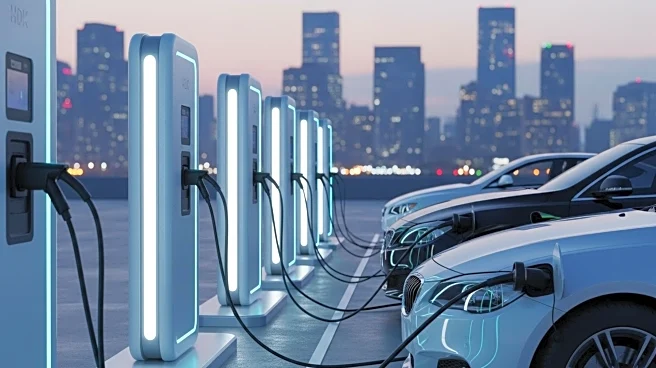What's Happening?
President Trump has signed an executive order to eliminate electric vehicle (EV) incentives, which he has often criticized as an 'electric vehicle mandate.' This decision, coupled with a recent vote by Republicans in Congress to terminate the $7,500 tax credit, has led to a rush among consumers to purchase EVs before the incentives expire on September 30. Automakers are responding by offering additional discounts, resulting in a temporary surge in EV sales. According to JD Power, battery-electric vehicles are expected to account for 12.8 percent of car sales in August, marking an all-time high. Automakers are providing discounts of $6,700 per unit, which has lowered average EV transaction prices to $44,300, below the average price of gas-powered vehicles.
Why It's Important?
The expiration of federal EV incentives is significant as it could lead to a decrease in EV sales, impacting automakers and consumers alike. Automakers may face challenges in moving their inventory without the support of federal incentives, potentially leading to increased discounts and financial strain. The temporary surge in sales highlights consumer interest in EVs, but the long-term impact may include a slowdown in adoption rates. This development could affect the U.S. automotive industry, which is striving to compete globally, particularly against countries like China that are advancing rapidly in EV technology.
What's Next?
As the expiration date for the incentives approaches, automakers may need to increase discounts further to maintain sales momentum. The industry is likely to experience a period of adjustment, with potential delays or cancellations of certain EV models. Major automakers such as Ford, Tesla, Volkswagen, and Toyota are expected to continue their efforts to introduce more affordable EVs to the market. The focus will likely shift towards improving battery technology, range, and charging infrastructure to sustain consumer interest in EVs despite the loss of federal support.
Beyond the Headlines
The decision to end EV incentives raises questions about the U.S. commitment to reducing carbon emissions and transitioning to sustainable transportation. The move may slow progress towards environmental goals and affect public perception of EVs as a viable alternative to traditional vehicles. Additionally, the political implications of this decision could influence future policy discussions on renewable energy and climate change.








